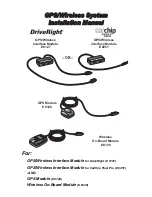
yellow
blue
4-22
At the entrance, there is usually a ramp that leads to the
freeway. If you have a clear view of the freeway as you
drive along the entrance ramp, you should begin to
check traffic. Try to determine where you expect to
blend with the flow. Try to merge into the gap at close to
the prevailing speed. Switch on your turn signal, check
your mirrors and glance over your shoulder as often as
necessary. Try to blend smoothly with the traffic flow.
Once you are on the freeway, adjust your speed to the
posted limit or to the prevailing rate if it’s slower. Stay
in the right lane unless you want to pass.
Before changing lanes, check your mirrors. Then use
your turn signal.
Just before you leave the lane, glance quickly over your
shoulder to make sure there isn’t another vehicle in your
“blind” spot.
Once you are moving on the freeway, make certain you
allow a reasonable following distance. Expect to move
slightly slower at night.
When you want to leave the freeway, move to the proper
lane well in advance. If you miss your exit, do not,
under any circumstances, stop and back up. Drive on to
the next exit.
The exit ramp can be curved, sometimes quite sharply.
The exit speed is usually posted.
Reduce your speed according to your speedometer, not
to your sense of motion. After driving for any distance
at higher speeds, you may tend to think you are going
slower than you actually are.
Summary of Contents for 1999 Park Avenue
Page 6: ...yellowblue vi NOTES...
Page 126: ...yellowblue 2 68 The Instrument Panel Your Information System...
Page 129: ...yellowblue 2 71 Cluster With DIC United States version shown Canadian similar...
Page 152: ...yellowblue 2 94 NOTES...
Page 188: ...yellowblue 3 36 NOTES...
Page 257: ...yellowblue 5 29 NOTES...
Page 258: ...yellowblue 5 30 NOTES...
Page 376: ...yellowblue 7 40 Maintenance Record DATE ODOMETER READING SERVICED BY MAINTENANCE PERFORMED...
















































